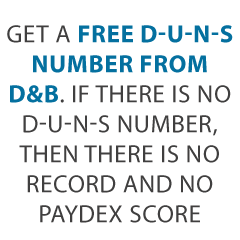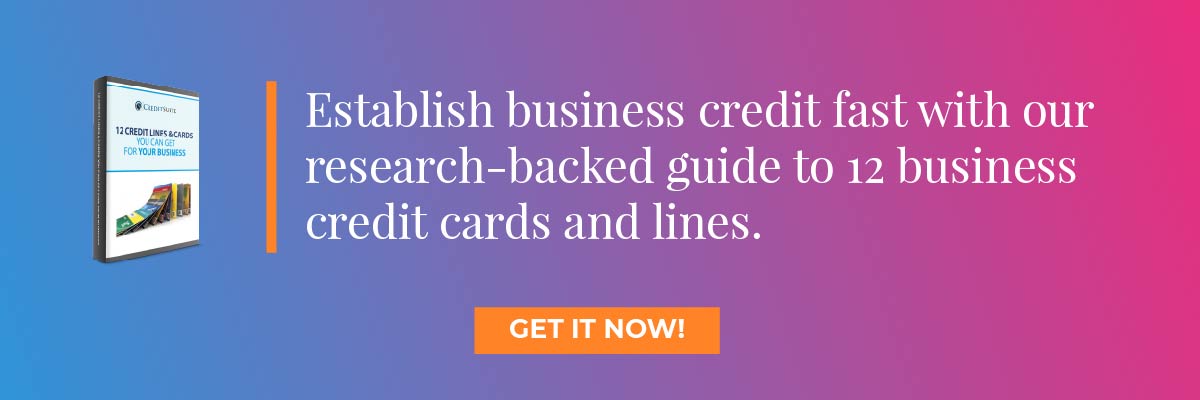- Connect With Us!
- (877) 600-2487
- info@creditsuite.com
I Did It My Way: 7 Steps to Build Business Credit When Self-Employed
Published By Faith Stewart at February 6th, 2019
It’s Not a Dream, You Really Can Build Business Credit When Self-Employed
Being self-employed, running your own business, is a feat all its own. America is full of great stories about businesses built from the ground up. These stories inspire us, motivate us, and reassure us that owning your own business and being self-employed really is possible. It is a goal that becomes even more attainable once you learn to build business credit when self-employed.
If you are self-employed, you may think the only funding options you have require you to use your personal credit. This isn’t necessarily true. Your business can have its own credit score. This allows you to access funds for your business that are not related to or reliant upon your personal credit.
It doesn’t happen overnight. It is a process, and it takes time, but if you trust the process and follow the steps you can build business credit when self-employed, and your business can become a dream come true.
1. You Can’t Be Too Legit: Appear Fundable
Creditors want to see an established, solid business that appears to be fundable. Being self-employed sometimes makes this difficult because it is tempting to simply let your business ride as an extension of yourself. To look fundable, the business must be separate from you and your personal credit. There are a few ways to make this happen.
Get an EIN, Ditch the SSN
 We are a nation run on numbers. We use numbers for virtually everything, including identification. You have your social security number, your driver’s license number, your PIN number, and about a million other numbers that run through your daily life. Your business needs an identifying number separate from all of these if you are to build business credit when self-employed.
We are a nation run on numbers. We use numbers for virtually everything, including identification. You have your social security number, your driver’s license number, your PIN number, and about a million other numbers that run through your daily life. Your business needs an identifying number separate from all of these if you are to build business credit when self-employed.
The IRS can issue an EIN, which is the business equivalent of an SSN. It is free via the IRS website and a vital first step in separating your business from yourself.
Incorporate
It is extremely difficult to build business credit when self-employed as a sole proprietor or partnership. You need to organize your business as a corporation, S-Corp, or LLC. This not only further establishes your business as its own entity, but it also offers you some protection from liability for business debts.
Establish business credit fast with our research-backed guide to 12 business credit cards and lines.
Contact Information
Your business needs its own telephone number, fax number, and address. A virtual address is fine, but don’t rely on a P.O. Box. An 800 number or some other toll-free exchange is best, and be sure to get a business listing in the directories.
Online Image
Set up a dedicated email for your business as well as a professional looking website. Even the most solid of businesses will look like a farce to creditors if they check it out and the website is poorly put together. It doesn’t have to be elaborate, but it should be free from errors, all links should work, and it should be professional in appearance. The same is true of an email address that is simply joebusinessowner@gmail.com. The business email address needs to reflect that it is specifically for the business. Something like “yourbusinessname@businessURL.com” is what you need.
2.The Numbers Don’t Lie: Keep Excellent Financial Records
Ditch the shoebox for an actual accounting system. It doesn’t have to be expensive or hard to use. QuickBooks online is a solid go-to, and there are plenty of other options as well. This will help you when lenders need to see reports, as you can just run them from the system.
Along these same lines, be sure you have a separate bank account for your business, and use it to keep business finances separate from personal finances. Pay yourself a salary from this account, but do not use your personal account for business expenses or your business account for personal expenses.
While this does not directly build business credit when self-employed, it does further establish your business as a separate entity and allows you to offer creditors a more accurate business financial picture.
3.Get a D-U-N-S Number: It is Mission Impossible to Build Business Credit While Self-Employed Without One
Once the first two steps are complete, you need to sign up for a free D-U-N-S number from Dun & Bradstreet. While they are not the only business credit reporting game in town, they are probably the most commonly used by creditors. It is vital to build business credit when self-employed with Dun & Bradstreet, and to do that, you must have a D-U-N-S number.
When you sign up for a D-U-N-S number, they will try to sell you other products and services. Put on blinders and keep moving forward. None of those things are necessary, and the number is totally free. Having a credit score with Dun & Bradstreet, called a PAYDEX, requires both a D-U-N-S and at least three tradelines reporting. It is impossible to have a PAYDEX without a D-U-N-S number.
4. Get Reported: Give them Something to Talk About
It is also impossible to have a credit score of any type, from any credit reporting agency, without creditors that will report your payments. This is where it gets dicey. You have to have credit to build your credit score. How do you do that? How do you get credit without a credit score?
Establish Tradelines
You establish tradelines with starter vendors. These are vendors in the vendor credit tier that will issue invoices with Net 30 or longer terms. While you may need to make a few initial purchases with these vendors to establish yourself as a customer before they will extend these terms, there is no personal credit check. They do sometimes want to see a certain amount of time in business however.
As you pay the invoices consistently and on-time, these vendors will report your payments to the credit reporting agencies, thus establishing your business credit profile. Some of the most common and easiest to start with are Uline, Quill, and Grainger.
These are the easiest to start with simply because they sell products that most any business can use on a daily basis. Items such as paper, toner, pens, pencils, packing supplies, and even janitorial supplies. After you order from them a few times, apply for net 30 terms, pay on time, and watch your business credit score start to build like a snowball rolling downhill.
Once you have 8 to 10 tradelines reporting your on-time payments to the credit agencies, you can start to apply to creditors in the other credit tiers.
- Retail Credit Tier– Credit attached to specific stores such as Amazon, Home Depot, and Best Buy.
- Fleet Credit Tier– Companies that offer credit for fuel purchases as well as automobile repair and maintenance.
- Cash Credit– These are the large, well-known credit companies such as Visa, MasterCard, and American Express.
As you can see, it all starts with building trade lines through the vendor credit tier. Then a whole credit world opens up to you!
Establish business credit fast with our research-backed guide to 12 business credit cards and lines.
Ask Utilities to Report
The more businesses you have reporting to the credit agencies where you make consistent, on-time payments each month, the faster your business credit will build. In addition to tradelines, you can ask that your utility companies report your payments to credit agencies. While they are not required to, some will if asked. If they will, and you pay on time, it can only help build business credit when self-employed faster.
5. Be a Team Player: Work with SBFE members
The SBFE, or Small Business Finance Exchange, is a not-for-profit entity. It gathers data on small businesses from lenders that are SBFE members. They then use this information to create credit products that lenders can use to make credit decisions.
How Does the Small Business Finance Exchange Work?
They use what they call a “give-to-get” model. Members release information about those they extend credit to. In return, members are able to receive information through the SBFE which can help them make future credit decisions.
It all starts with SBFE member reporting payment history and other information about borrowers. Then, the SBFE normalizes the raw data into usable data. It then sends this data to partners called certified vendors. Some credit agencies, including Dun & Bradstreet, are certified vendors.
Certified Vendors then use the information from the SBFE to create credit reporting products that only other SBFE members can access.
Members have access to the data since they also contribute information.
How Can They Help You Build Business Credit When Self-Employed?
When you do business with SBFE members, you know your information is being reported. This means you are building business credit. How do you know if your lender or vendor is a member? Ask them. If they are not, consider mentioning that they become a member. However, there are enough members that it should not be difficult to find plenty to do business with.
6. Keep Your Eye on the Prize: Credit Monitoring is Vital to Build Business Credit When Self-Employed
 Once you have a D-U-N-S number and some accounts reporting, you will want to keep an eye on your credit report. Credit monitoring serves a couple of different purposes.
Once you have a D-U-N-S number and some accounts reporting, you will want to keep an eye on your credit report. Credit monitoring serves a couple of different purposes.
The first purpose is to, of course, ensure your credit report is accurate and complete. If there is missing or incorrect information on your credit report, you will need to get it corrected. Request corrections in writing, and send copies, not originals, of backup documentation.
The other reason it is important to monitor your credit is so you know which accounts are reporting, how many accounts are reporting, and when you qualify to start applying for credit in higher tiers. You need at least 14 accounts reporting to get approval at the cash credit tier, and you will never know if you have that if you are not monitoring your credit score.
You can also watch your score rise. This is powerful motivation for the self-employed, or anyone for that matter. It will help you stay the course while you build business credit when self-employed. The easiest way to do this is with a credit monitoring service.
7. Make Your Payments: You Can’t Play if You Don’t Pay
None of the steps you take to build business credit when self-employed will matter at all if you do not make your payments consistently on-time. While this is not the only factor in your business credit score, it is the one with the most impact. Whether or not you make your payments each month, on-time, is the number one factor that creditors use to determine your fundability.
Why Is Important to Build Business Credit When Self-Employed?
There are a couple of reasons why it is important to actively try to build business credit when self-employed.
Protect Your Personal Credit
It is widely important to business success that you build business credit when self-employed. Without business credit, your ability to fund your business is solely on the merits of your personal credit. If you have great personal credit you may not think that is such a big deal.
However, that means your business financial issues can impact your personal credit as well. Limits on personal credit cards are not as high as those on business cards. This means just by the nature of business transactions you may always carry a balance near your limits.
This affects your debt to credit ratio negatively, which negatively impacts your credit score even if you are making your payments on time. If your business has its own credit, this is not a problem. Limits are higher, so you have more credit to work with, and regardless, it doesn’t affect your personal credit.
Establish business credit fast with our research-backed guide to 12 business credit cards and lines.
Access Funds to Grow and Expand your Business
When you have solid business credit, you have access to funds to do the things you need to do in the course of normal business. Not only that, you can handle any issues that come along that require cash outlays larger than what your cash on hand can cover comfortably.
Think about it. Things happen. Copy machines break. Printers and computers need replacements over time. Ovens explode. Cars break down. When these things happen, you need to be able to take care of them without disrupting the course of your business.
In some cases, the need is seasonal. You can find yourself in a cash crunch if most of your business happens in one quarter of the year. Strong business credit will give you access to the funds you need to bridge these seasonal cash gaps.
You Can Build Business Credit When Self-Employed, Just Follow the Steps
Being self-employed should not be a deterrent to building business credit. To get started, you simply have to separate your business from yourself. Once you have it established as a separate entity, you can get to work applying for tradelines that will report your payments to the credit agencies. From there, if you follow these steps, your credit score will explode, as will your ability to fund your business.

 " class="attachment-blog-single size-blog-single wp-post-image" alt="Get Business Credit Cards for New Businesses Credit Suite-Business Line of Credit Decoded" title="Get Business Credit Cards for New Businesses">>
" class="attachment-blog-single size-blog-single wp-post-image" alt="Get Business Credit Cards for New Businesses Credit Suite-Business Line of Credit Decoded" title="Get Business Credit Cards for New Businesses">>